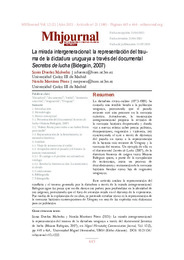Título :
La mirada intergeneracional: la representación del trau-ma de la dictadura uruguaya a través del documental Secretos de lucha (Bidegain, 2007) |
Autor :
Martínez Pérez, Natalia
Dueñas Mohedas, Sonia |
Editor :
Universidad Miguel Hernández de Elche |
Fecha de publicación:
2021-07-31 |
URI :
http://hdl.handle.net/11000/26367 |
Resumen :
La dictadura cívico-militar (1973-1985) ha causado una terrible herida a la población uruguaya, provocando que el pasado reciente esté aún presente en la memoria colectiva. Actualmente, la transmisión intergeneracional propicia la revisión de la memoria histórica despertando y dando voz a nuevos relatos sobre presos políticos, desapariciones, migración y violencia, (re)construyendo el ayer a través de discursos del pasado en torno a la representación de la historia más reciente de Uruguay y la memoria del trauma. Un ejemplo de ello es el documental Secretos de Lucha (2007), de la directora francesa de origen vasco Maiana Bidegain quien, a partir de la compilación de testimonios, inicia un proceso de descubrimiento y restauración de la memoria histórica familiar como hija de migrantes uruguayos. Este artículo analiza la representación del conflicto y el trauma generado por la dictadura a través de la mirada intergeneracional. Bidegain sigue los pasos que un día dieron sus padres para profundizar en la identidad de sus orígenes, permitiendo que el foco de atención resida en el discurso de la experiencia. Por medio de la exploración de su obra, se pretende estudiar cómo es la representación de la memoria histórica contemporánea de Uruguay en uno de los capítulos más dolorosos para su población
The civil-military dictatorship (1973-1985) has caused a terrible wound to the Uruguayan population, causing the recent past to still be present in the collective memory. In these moments, intergenerational transmission favours the revision of historical memory, awakening and giving voice to new narratives about political prisoners, disappearances, migration and violence, (re)constructing yesterday through discourses of the past around the representation of Uruguay’s most recent history and the memory of trauma. An example of this is the documentary Secretos de Lucha (2007), the work of the French director of Basque origin Maiana Bidegain who, through the compilation of testimonies, begins a process of discovery and restoration of her family’s historical memory as the daughter of Uruguayan migrants.This article analyses the representation of the conflict and trauma generated by the Uruguayan dictatorship through the eyes of a new generation. Bidegain follows in the footsteps of her parents to delve deeper into the Uruguayan identity of her origins, allowing the focus to reside in the discourse of experience. Likewise, through the exploration of his documentary work, the aim is to study the representation of Uruguay’s contemporary historical memory in one of the most painful chapters for its population
|
Palabras clave/Materias:
Collective memory
Dictatorship
Documentary
Exile
Migration
Uruguay |
Área de conocimiento :
CDU: Ciencias sociales |
Tipo de documento :
info:eu-repo/semantics/article |
Derechos de acceso:
info:eu-repo/semantics/openAccess
Attribution-NonCommercial-NoDerivatives 4.0 Internacional |
DOI :
https://doi.org/10.21134/mhjournal.v12i.1333 |
Publicado en:
Vol. 12 (2021) |
Aparece en las colecciones:
Miguel Hernández Communication Journal Núm.12 (2021)
|
 La licencia se describe como: Atribución-NonComercial-NoDerivada 4.0 Internacional.
La licencia se describe como: Atribución-NonComercial-NoDerivada 4.0 Internacional.
.png)
